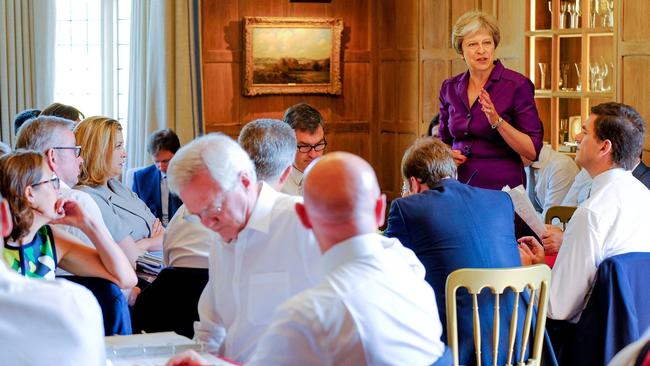Brexit secretary David Davis: hard exit blow to Theresa May
Theresa May got her cabinet to approve her soft Brexit plan at Chequers, but then a key member voted with his feet.

In the multiple accounts of what happened on Friday at a Brexit crisis meeting in British Prime Minister Theresa May’s country residence, David Davis’s name was conspicuous by its absence.
Some, such as Work and Pensions Secretary Esther McVey, sounded off about Brexit policy compromise at Chequers. Others, such as Chancellor of the Exchequer Philip Hammond, were snippy at colleagues. Dumbfounded ministers watched Foreign Secretary Boris Johnson toast the new-found collective responsibility around a deal he did not like.
Few focused on the cabinet minister at the heart of the process: Davis. One colleague said the Brexit secretary seemed grumpy. He used his intervention to rerun the arguments he has rehearsed in private, and occasionally in public: that No 10 should approach the negotiations with more ambition.
This time he complained at the scale of the concessions that No 10 was due to make. One cabinet minister said: “He was saying we could dig in for longer, we as a government don’t need to make any concessions at this point.”
One of those present said it sounded like a “weak argument”. Justice Secretary David Gauke rejected this at the time, saying that holding out for “no deal is a bit like holding a gun to your own head. A little bit like the sheriff in Blazing Saddles.”
Davis said nothing and declined to resign right away. Then, after discussing the matter with friends and family at the weekend, he tendered his resignation just before midnight (9am yesterday, AEST).
Why did he not go on the day? One ally said Davis had indicated he might jump on Tuesday, Wednesday and Thursday last week. Then, on the day of the Chequers meeting a source claimed he was “too dumbfounded with the way Michael Gove behaved” to resign after the Environment Secretary brought the cabinet behind May. He is also unlikely to have wanted to go in the heat of the moment, and by waiting it looks less like a temper tantrum and more like a considered judgment.
On Saturday, Davis was still in contact with his department, where staff noticed his despondency but did not realise he would quit. On Sunday he had a family engagement at Silverstone, then went to No 10 to resign.
When a Downing Street aide was asked mid-evening whether Davis was about to go, the special adviser replied, laughing, that he was “just going for a drink with Robbie Gibb”, director of communications and an old friend, and that it was safe to go home.
Davis’s failure to resign had become something of a joke. The Brexit secretary was on the brink last month over May’s proposal for a legally binding backstop. At that point he appeared prepared to step back from the brink without meaningful concessions.
Underlying much of this has been the deteriorating relationship with Olly Robbins, the Prime Minister’s Europe adviser. When first appointed, it appeared that Davis would largely be conducting the Brexit negotiations himself, and officials maintained that fiction in public. However, his role in Brussels dwindled and May took Robbins into the Cabinet Office. The distance hardened the opposition between the two men. It was Robbins’s blueprint that was agreed at Chequers, not Davis’s, after a week of talks.
The meeting will always be cast by some Brexiteers as surrender. All sides agree it was an important moment in May’s journey from hard to soft Brexit. She had secured the consent of her cabinet that Britain should look broadly similar in many areas after leaving the EU, forcing the most ardent Brexiteers to swallow substantial compromises and promise not to criticise her plan in future.
Some say she looked tense at the start of the day but by the end she was relaxed, with the mood over dinner a bit more akin to a “holiday camp”, according to one review. The stakes could not have been higher.
“Before Friday she had already reached the conclusion that if she couldn’t deliver her cabinet on this she was effectively finished,” one ally said.
It was an illusion of unity. While all cabinet ministers signed in blood, Davis’s resignation will cause untold damage. One has said that May needed to keep Davis onside to keep her government and party together.
Cabinet ministers had claimed that the Chequers sea change was significant.
“What was clear was that those who were more enthusiastic about Brexit were to some extent confronted by the hard choices available and couldn’t in all honesty claim any different, or deny these were the choices available. Nor did they have their own alternative. Mrs May has shown ‘plan beats no plan’.”
Now this verdict is less clear.
The Times


